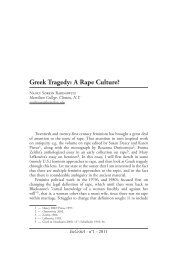Perspectives On and Of Livy's Tarpeia - EuGeStA
Perspectives On and Of Livy's Tarpeia - EuGeStA
Perspectives On and Of Livy's Tarpeia - EuGeStA
Create successful ePaper yourself
Turn your PDF publications into a flip-book with our unique Google optimized e-Paper software.
186 TaRa WeLCh<br />
understood in Roman terms, whereas horatia’s death <strong>and</strong> its legalistic<br />
aftermath restore harmony between the state <strong>and</strong> the individual.<br />
horatia’s episode falls in mid-book, between the fantastic stories of<br />
Rome’s rise <strong>and</strong> the tragedy of Lucretia. The albans <strong>and</strong> Romans have<br />
been itching for a fight <strong>and</strong> are moving toward open war against each<br />
other when Mettius, the alban dictator, proposes an alternative: that the<br />
contest between the two states be resolved by single battle, or rather, triple<br />
battle, with a set of three brothers from each side st<strong>and</strong>ing in for his whole<br />
army. In the staged contest, the alban brothers at first gain the upper<br />
h<strong>and</strong>, killing two of the Roman brothers. But then the remaining Roman<br />
combatant separates <strong>and</strong> kills all three of the alban brothers. fresh from<br />
his victory, he parades his spoils before his cheering, safe, victorious-byproxy<br />
Roman comrades. When his sister sees the spoils <strong>and</strong> recognizes<br />
among them the battle cloak she had woven for one of the now-dead<br />
alban brothers, to whom she had been betrothed, she laments <strong>and</strong> calls<br />
his name. her Roman brother, upset at her allegiance to his defeated<br />
enemy, kills her on the spot. The crowd is horrified at his action yet hesitant<br />
to scorn its champion, <strong>and</strong> the matter comes before the king, who<br />
establishes a special court for adjudicating the case. The court pronounces<br />
the Roman soldier guilty <strong>and</strong> m<strong>and</strong>ates his execution, whereupon the<br />
soldier’s father intervenes, claiming he believes his son did the right thing,<br />
otherwise he would himself have killed the boy. The crowd <strong>and</strong> king are<br />
moved, the boy is subjected to a symbolic punishment, a sacrifice expiates<br />
any wrong, the albans come join the Romans, <strong>and</strong> all ends well – except<br />
for the dead sister.<br />
<strong>and</strong>rew feldherr has interpreted at length this episode’s construction<br />
<strong>and</strong> deconstruction of civic identity, across the categories of self (Roman)<br />
<strong>and</strong> other (alban), <strong>and</strong> family <strong>and</strong> state 46 . his analysis traces the way<br />
these categories become distinct only to collapse into each other, only to<br />
become again distinct. for example, the albans are initially elided with<br />
the Romans through their common ancestor aeneas. No one even knows<br />
which set of brothers were Roman <strong>and</strong> which alban, so alike were they.<br />
Indeed they are so alike as to have produced <strong>and</strong> reared a set of triplet brothers,<br />
matched in age <strong>and</strong> strength to the enemy set (trigemini fratres, nec<br />
aetate nec uiribus dispares, 1.24.1). But then, alban <strong>and</strong> Roman separate<br />
into distinct categories <strong>and</strong> mutual (specious) hostility, except they are<br />
aligned by their common motive for this hostility (desire for glory). The<br />
surrogate battle of the brothers again distinguishes alban <strong>and</strong> Romans,<br />
both triplets <strong>and</strong> spectators, but then the peoples come to live together<br />
as one in Rome. In terms of family <strong>and</strong> state, the victory of the youngest<br />
46 — feldherr 1998: 123-143.



